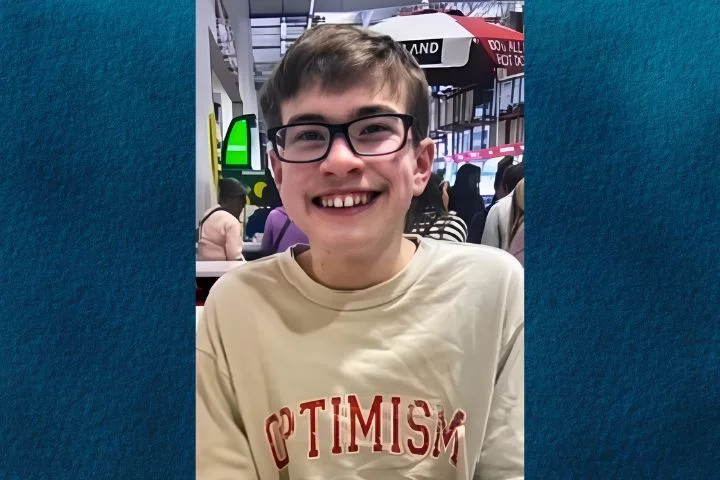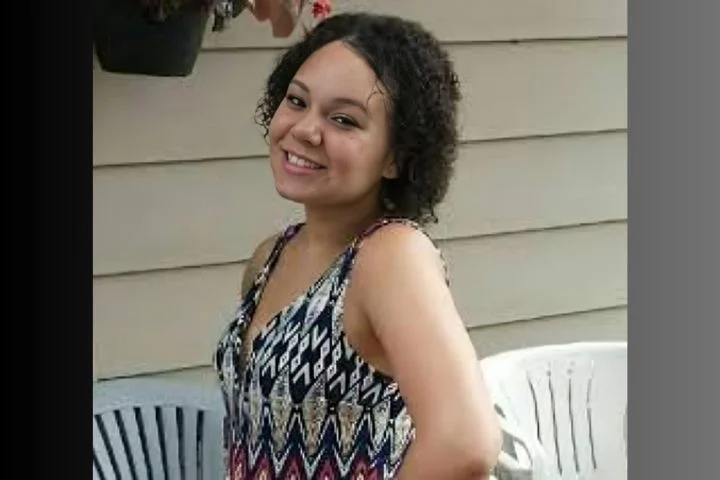Jenna Van Gelderen arrived at her parents’ home in the Druid Hills neighborhood of Atlanta, Georgia on the afternoon of Friday, August 18, 2017. The 25-year-old had agreed to house-sit for them and take care of their elderly cat, Jessie, while they were in Canada for the weekend. Around 2:00 am Saturday, Jenna spoke with one of her close friends and said that she was going to bed. It was the last time anyone heard from her.
On Saturday morning, a veterinary nurse arrived at the house to give Jessie a scheduled injection. He had been told that Jenna could be there to let him in, but when he knocked on the door, he got no answer. The nurse called Jenna’s brother, William, to see if he could let him into the house so he could treat Jessie. When William arrived at his parents’ house, the doors were locked and there was no sign of Jenna or her car.
William looked through the house and realized that an Egyptian tapestry was missing from its frame; the tapestry, one of three Jenna’s grandfather had collected during the 1940s, had sentimental value to the family but wasn’t worth much money. Several lights and a television had been left on, and there was no food in the cat’s bowl. Jenna’s suitcase, purse, and cell phone were missing from the house, but her shoes, as well as all of her makeup and toiletries, had been left behind. Her cell phone charger was also found at the house. William called his parents, Roseanne Glick and Leon Van Gelderen, and told them he wasn’t sure what had happened to Jenna.
Jenna had moved out of her parents’ home because she wanted more freedom, but they weren’t sure she was ready to be an independent adult. She had been diagnosed with a developmental disability when she was a child, and she was diagnosed with autism in 2016. Her disabilities affected the way she interacted with people; she was very naïve and tended to trust people without hesitation. Her father, Leon, noted. “Because she’s very impressionable, she has been taken advantage of by a lot of people.”
Jenna had some friends that her parents thought were of questionable character, and they had told her that they didn’t think she should associate with them. This angered Jenna, and she decided to move out of her parents’ house but refused to tell them where she was living.
William tried to reach his sister on her cell phone, but he only got her voicemail. He and his parents then reached out to some of Jenna’s friends, hoping they might know where she had gone. None of them had heard from her.
By Sunday morning, Jenna’s family was worried that something might have happened to her. Although Jenna no longer lived with her parents, she usually spoke with her mother a couple of times a day and it was unusual for her to ignore phone calls. She also loved Jessie and knew that the 21-year-old cat was under the care of a veterinarian; her parents didn’t believe that she would have willingly abandoned the beloved pet. Leon and Roseanne were still in Canada, so William called and reported his sister missing.
Investigators with the DeKalb County Police Department were unsure what had happened to Jenna. There was no sign of forced entry at her parents’ home, and the fact that her purse, cell phone, and car were missing with her led them to believe that she had left voluntarily.
One of Jenna’s friends told investigators that he had seen her on Friday, but hadn’t been in touch with her since then. Another friend confirmed that she had spoken to Jenna around 2:00 am Saturday; she had tried calling her several times on Saturday, but her calls went straight to voicemail.
Leon and Roseanne returned home from Canada on Monday, hoping that Jenna would be at the house when they arrived. Unfortunately, there was still no sign of her. Leon told reporters that they were confused by their daughter’s disappearance. “There was no reason to believe she would leave unexpectedly…what woman takes off and leaves her makeup and toiletries and shoes behind?” Roseanne feared the worst. “I felt like something is not right, something has happened. I knew something was wrong.”
Shortly after Jenna went missing, her family learned that she had a second cell phone that wasn’t connected to her parents’ phone plan; this phone pinged off a cell phone tower in Fairburn, Georgia around 7:15 am on Saturday. This was around 20 miles from her parents’ home in Druid Hills; it’s unclear if Jenna was with her phone at this point.
William was able to access Jenna’s Google account, and he discovered that she had been using Google Chat to talk to an unidentified person in the hours leading up to her disappearance. This person had been encouraging Jenna to leave her parents’ house that night and go back to her own apartment. Jenna did leave the Druid Hills home around 10:30 pm Friday, but she returned at 1:15 am. She was still there at 2:00 am when she told one of her friends that she was getting ready to go to bed. It’s unclear what happened after that.
On August 24, 2017, Jenna’s parents got a call from police in a different jurisdiction who told them that Jenna had been found. The following day, however, police said that Jenna was still missing. William explained, “It sounds like they thought they had her last night and this morning they told us they made a mistake. So we’re meeting with the detectives right now to figure out what actually happened.” A spokesperson for the DeKalb County Police denied that there had been any mistake on their part. “We never said that we found her. We are actively investigating.”
Although there were no signs of forced entry at the house, detectives and the family were puzzled by the missing Egyptian tapestry. Although it didn’t have a high monetary value, it was rather large, approximately 5 feet long and 2 feet wide. It had been mounted in a heavy frame, which had been hung back on the wall after the tapestry was removed. William noted that hanging it back up would have taken at least two people.
Jenna’s family feared that someone had taken advantage of her vulnerable mental state and they were desperate to find her. They started a Facebook page to raise awareness about her disappearance and offered a $10,000 reward for information leading to her safe return. They also hired a private investigator to assist in their search for answers.
Leon said that Jenna had been manipulated by people in the past; six months earlier, she had been fired from her job at a local pet store for stealing $3,000 from the company. She tried to tell her family that she had been framed by the store manager, but they believed she had been coerced into doing so by some men she thought were her friends. In reality, they seemed to have befriended her because they knew they could take advantage of her. Jenna’s family feared that these men were responsible for her disappearance; they worried that she might have become a victim of human trafficking.
On September 5, 2017, a woman who had heard about the case through Facebook spotted Jenna’s dark blue Mazda in northwest Atlanta and called the police. Investigators discovered that the car had been left unlocked with some of Jenna’s belongings inside. They found her suitcase and purse in the car, but the position of the seat indicated that someone else had been driving it. Jenna was tiny, only 4 feet 11 inches tall, and the seat was pushed back to accommodate a much taller driver. There was also a cell phone charger that didn’t fit either of Jenna’s phones.
DeKalb County investigators obtained search warrants for Jenna’s cell phone records, but there was no activity on either one since the Saturday she went missing. They conducted several searches of the area of Atlanta where her car had been abandoned, but they found no clues to her whereabouts.
Months went by and Jenna remained missing. In October 2018, Roseanne admitted that the uncertainty surrounding her daughter’s fate was frustrating. “The worst part is not knowing. We’re in a constant battle with our emotions, whether to hope or give up. We can’t rest.” Although DeKalb Police Chief James Conroy told reporters that the investigation remained a priority for the department, Jenna’s parents didn’t believe police were doing enough to find their daughter.
According to Leon, police had never obtained a search warrant for the apartment where Jenna rented a room from a friend. Investigators removed Jenna’s belongings from the apartment, but said she didn’t have any bedding or pillows there. “The roommate claimed she was sleeping on the floor, which we know is not Jenna, but they didn’t think that was sufficient enough to get a search warrant.” He worried that potential evidence had been lost. “Now, after a whole year, we’re no further along. The police have bungled things tremendously.”
Leon was disappointed with the way the investigation had been handled from the beginning. “Something as simple as interviewing our neighbors could’ve made the difference, but they never even bothered to figure out who was staying on our street or interview a single person.”
Two years after Jenna was last seen, the reward for information was up to $50,000. Detectives said they were still actively working on the case, but Jenna’s parents were frustrated with the lack of progress. “Two years of frustration…so much of what the authorities do is kept under wraps from us and not shared, they keep telling us they are actively working the case and don’t feel like the work they are doing is being appreciated.”
Investigators didn’t believe that Jenna had been a victim of foul play; they pointed out that she locked the house behind her when she left and there was no sign of a struggle taking place in the house or in her car. Her parents stated that Jenna’s cognitive disabilities meant that she was unable to recognize when people were taking advantage of her or placing her in dangerous situations. They were certain that she would have contacted them if she were able to; the fact that she hadn’t made them believe she had been taken against her will.
Roseanne admitted that her daughter wasn’t great at reading people. “She was extremely gullible, extremely vulnerable because she wanted friendships so badly and she couldn’t always tell when their intentions were maybe to not be a good friend.”
In October 2019, the Georgia Bureau of Investigation joined the search for Jenna. Although her car had already been processed for evidence, technicians from the GBI went back over the car to make sure nothing had been missed. They also collected Jenna’s toothbrush so it could be processed for DNA evidence. Jenna’s family was hopeful that the GBI would finally be able to provide them with some answers, but the case soon stalled.
On August 29, 2021, Jenna’s loved ones held a memorial service for her. Rabbi Ari Kaiman stated, “Four years ago, we gathered with candles and the shofar to call Jenna home. We believed with the help of God, law enforcement, and the power of community, Jenna would return to us. Our hope has grown diminished.”
Jenna’s parents believed that their daughter had been murd*ered, and she was remembered at the memorial service as a caring young woman who loved her family and was constantly questioning everything around her. Rabbi Kaiman noted, “The case is still open, and we pray for justice for Jenna, but we no longer expect Jenna to return home.”
Jenna Ruth Van Gelderen was 25 years old when she vanished from Atlanta, Georgia in August 2017. Jenna was a kind and friendly young woman who had been diagnosed with autism and a learning disability that left her vulnerable and unable to understand that not everyone was looking out for her best interests. Jenna has brown eyes and black hair, and at the time of her disappearance, she was 4 feet 11 inches tall and weighed 140 pounds. She was last seen wearing black yoga pants and a green T-shirt, and she has a Star of David tattoo on her thigh. If you have any information about Jenna, please contact the Georgia Bureau of Investigation at 800–597–8477 or Crime Stoppers at 404–577–8477.






